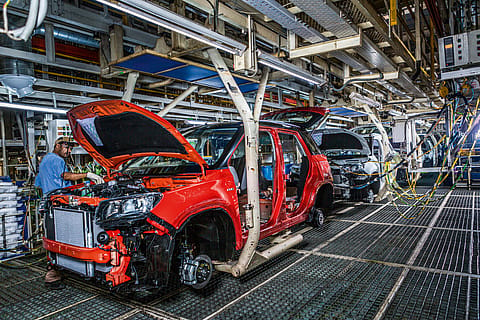PV sales up 22% in January; total retail rises 14%: FADA
All categories were in green in January 2023, with 2-wheeler, 3-wheeler, passenger vehicle, tractor and commercial vehicles growing by 10%, 59%, 22%, 8% and 16%, respectively, FADA data shows.

The passenger vehicle (PV) segment continued to perform well in January 2022, with a growth of 22% year-on-year at 3.40 lakh units as compared to 2.79 PV units sold in the year-ago period. The PV sales rose 10% over the January 2021 period, and 8% over the pre-Covid month of January 2020, according to the latest data by auto retailers' body Federation of Automobile Dealers’ Association (FADA).
In the PV segment, India's largest carmaker Maruti Suzuki Ltd and Hyundai Motor emerged as the top passenger vehicle (PV) sellers in January, selling 1,50,046 and 45,799 units, respectively, the FADA data shows. Their market share increased YoY to 44.10% and 13.46% in January 2023, respectively. Other PV makers Tata Motors, Kia Motors India and Toyota Kirloskar Motor sold 45,061 (13.24% market share), 19,297 (5.67%) and 10,941 units (3.22%), respectively.
While reasonable enquiry, healthy bookings and improved supplies are helping aid this segment, it is the entry-level sub-segment which is still feeling the pinch, according to FADA. Apart from this, while the waiting period for some models has come down, compact SUVs, SUVs and luxury vehicles continue to witness minimum waiting of 2-3 months.
FADA chief Manish Raj Singhania said, “January’23 witnessed total retail rising by 14% YoY but was still down by 8%, compared to the pre-Covid month of January’20. All categories were in the green with 2-Wheeler, 3-Wheeler, Passenger Vehicle, Tractor and Commercial Vehicles growing by 10%, 59%, 22%, 8% and 16% respectively on YoY basis. EV fame-2 subsidy along with a demand from commercial 3W space is fuelling healthy growth."
The two-wheeler category showed a growth of 10% YoY but when compared to 2021 and the pre-Covid month of January’20, it continued to see pressure as the same fell by 7% and 13%. "While sentiments are improving at a snail’s pace and are better than what it was a year ago, the rural market is yet to fully come to the party as the cost of ownership has shot up significantly while disposable income has not increased in the same ratio," says Singhania.
In the two-wheeler category, Hero Motocorp and Honda Motorcycle and Scooter India, and TVS Motor Company topped the sale chart in January 2022, commanding market shares of 30.98%, 22.46%, 15.71% and 12.22%, respectively, the FADA data show.
In addition, the 3-wheeler segment has seen 60% growth YoY, 101% growth when compared to 2021 and is now slightly down by a mere 3% when compared to pre-pandemic levels in January’20. The commercial vehicle category has also shown robust growth by growing 16% YoY, 23% from January’21 and 6% from the pre-covid month of January’20. "Continued demand in the market due to replacement of fleet, growth in freight availability and government’s consistent push for infrastructure projects has helped the CV segment rise above pre-covid numbers,” says the FADA chief.
Recommended Stories
The national body of auto retailers in its outlook for 2023 says with China’s factory activity once again gaining pace, global supplies of parts and semiconductors will see a recovery, thus aiding better vehicle supplies and lower waiting period in future. "This will further fuel growth for the already healthy passenger vehicle category."
Notably, the Economic Survey 2022-23 tabled in Parliament said rural wages will rise at a steady positive rate as "inflation is expected to soften", which could translate into a rise in real wages. "We are hopeful that this will have its rub-off effect with the rise in 2-wheeler sales going ahead."
The association think the recent announcements in Budget 2023-24 will also help aid the overall growth of automobile retails in the country. "Demand for entry-level 2-wheelers and entry-level PV is likely to accelerate due to enhanced income tax rebate, budget allocation for vehicle scrappage policy and import duty exemption for manufacturing lithium batteries, thus reducing EV acquisition cost. A reduction in a surcharge at the highest IT slab will also benefit high-end vehicle sales. Apart from this, the capital outlay of Rs 10 Lakh Cr for Infrastructure spending will help aid CV sales which is already witnessing an upswing."
A FADA online survey conducted in January shows the average inventory for passenger vehicles ranging from 33-35 days, while two-wheelers' average inventory stands at 25-28 days. Liquidity remains good for 34.01% of retailers, while neutral for 50.34% and bad for 15.65% of them. When it comes to sentiments regarding the overall auto industry, for 36.73% of respondents, it's good, neutral for 48.1% and bad for 14.97% of the retailers.
(INR CR)